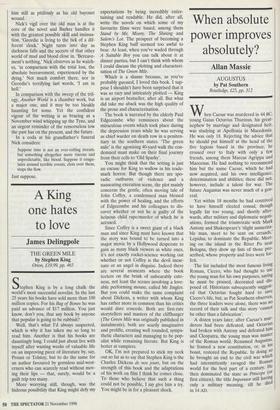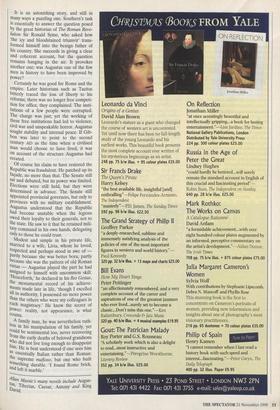When absolute power improves absolutely?
Allan Massie
AUGUSTUS by Pat Southern Routledge, £25, pp. 312 When Caesar was murdered in 44 BC, young Gaius Octavius Thurinus, his great- nephew by marriage and designated heir, was studying at Apollonia in Macedonia. He was only 18. Rejecting the advice that he should put himself at the head of the five legions based in the province, he crossed over to Italy with only a few friends, among them Marcus Agrippa and Maecenas. He had nothing to recommend him but the name Caesar, which he had now acquired, and his own intelligence, determination and abilities; these did not, however, include a talent for war. The future Augustus was never much of a gen- eral.
Yet within 18 months he had contrived to have himself elected consul, though legally far too young, and shortly after- wards, after military and diplomatic negoti- ations, formed the triumvirate with Mark Antony and Shakespeare's 'slight unmerita; ble man, meet to be sent on errands, Lepidus, to dominate the Republic. Meet- ing on the island in the River Po near Bologna, they drew up lists of those pro- scribed, whose property and lives were for- feit.
The list included the most famous living Roman, Cicero, who had thought to use the young man for his own purposes, saying he must be praised, decorated and dis- posed of. Historians subsequently suggest- ed that Octavius fought hard to save Cicero's life, but, as Pat Southern observes, the three leaders were alone, there was no record of their talk and this story 'cannot be other than a fabrication'.
A dozen years later, after Caesar's mur- derers had been defeated, and Octavius had broken with Antony and defeated bun and Cleopatra, the young man was master of the Roman world. Renamed Augustus., he framed a new constitution, or, in his boast, restored the Republic. In doing s° he brought an end to the civil war which had intermittently ravaged the Roman world for the best part of a century. He then dominated the state as Princeps (or first citizen), the title Imperator still having only a military meaning, till he died in 14 AD. It is an astonishing story, and still in many ways a puzzling one. Southern's task is essentially to answer the question posed by the great historian of The Roman Revo- lution Sir Ronald Syme, who asked how `the icy and bloodstained triumvir' trans- formed himself into the benign father of his country. She succeeds in giving a clear and coherent account, but the question remains hanging in the air. It provokes another one: was Augustus one of the few men in history to have been improved by power?
Certainly he was good for Rome and the empire. Later historians such as Tacitus bitterly traced the loss of liberty to his reforms; there was no longer free competi- tion for office, they complained. The insti- tutions of a few people were corrupted. The charge was just; yet the working of these free institutions had led to violence, civil war and unspeakable horror. Augustus sought stability and internal peace. If Gib- bon was later to point to the second century AD as the time when a civilised Man would choose to have lived, it was on account of the structure Augustus had created.
Of course his claim to have restored the Republic was fraudulent. He patched up its façade, no more than that. The Senate still sat and debated, but its power was limited. Elections were still held, but they were determined in advance. The Senate still appointed provincial governors, but only to provinces with no military establishment. Augustus understood that the Republic had become unstable when the legions owed their loyalty to their generals, not to the state. He saw to it that he retained mili- tary command in his own hands, delegating only to those he could trust.
Modest and simple in his private life, married to a wife, Livia, whom he loved, respected and perhaps stood in awe of Partly because she was better born, partly because she was the pattern of old Roman virtue — Augustus played the part he had assigned to himself with uncommon skill. Henceforth,' he declared in his Res Gestae, the monumental record of his achieve- ments made late in life, 'though I excelled all in authority, I possessed no more power than the others who were my colleagues in each magistracy.' He knew the secret of Power: reality, not appearance, is what counts.
A family man, he was nevertheless ruth- less in his manipulation of his family, yet could be sentimental too, never recovering from the early deaths of beloved grandsons who did not live long enough to disappoint He is best understood if one sees him as essentially Italian rather than Roman: the supreme mafioso, but one who built something durable. 'I found Rome brick, and left it marble.'
4, Ilan Massie's many novels include Augus- tus , Tiberius, Caesar, Antony and King ngDavid.



















































































 Previous page
Previous page